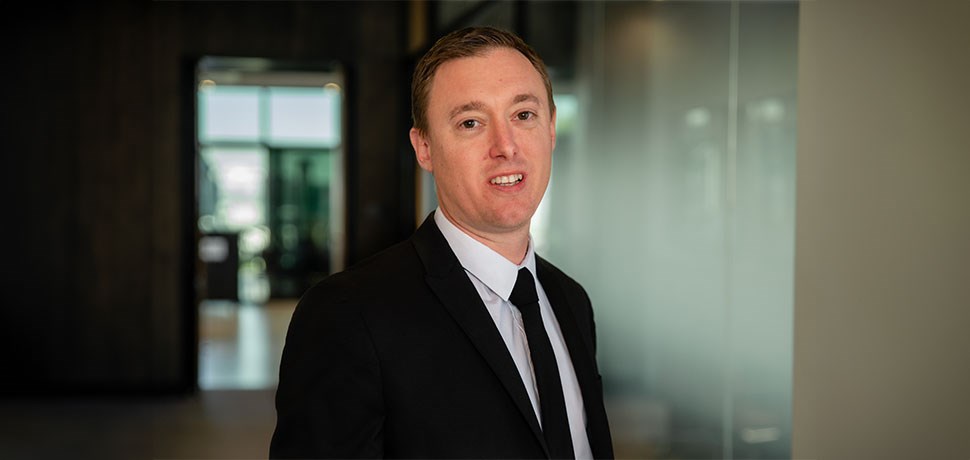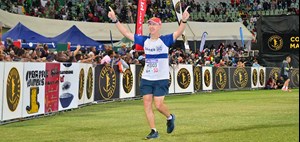Running is in Warren Lester’s blood. He spent countless weekends on a field waiting for his father to finish a race. His grandfather completed 12 Comrades Marathons, his father 13, and his mother two. Many Comrades Sundays were spent following his family along the 89 km route.
It was only a matter of time before he too would attempt the Ultimate Human Race. And so he did. In 2022 he completed his first Comrades Marathon in 10 hours and 15 minutes. It was a long day and tough race, marked by back spasms that started at 20 km. He went into that race overtrained, something he says happened to many runners with the race being in August instead of June. Despite all that, the day was a highlight. “The whole build-up was a lot more special. It was also very emotional seeing my parents following me all the way down and knowing how I struggled and managed to finish.”
This year, he returned for his back-to-back and smashed his previous time, finishing in 8 hours and 56 minutes. Not only that, he achieved every runner’s dream – a negative split race, running the second half 12 minutes faster than the first half.
There were four things he did differently in his training that helped him have a great day out: reduce mileage, focus on recovery, include strength training, and run training runs slower.
“I did a lot less training this year. I did one marathon, Two Oceans 56 km Ultra, and another 56 km training run.” He didn’t follow a specific training plan; rather he planned out big weekends and long runs and then listened to his body for cues. He averaged 65 km a week in training and peaked at 85 km. “I'm not a slave to mileage, if I'm not feeling good I'll run less or not run at all,” he says. Being from Durban meant he also got to train on the actual race day route.
I’m not a slave to mileage, if I’m not feeling good I'll run less or not run at all.
He also put a big focus on recovery and included strength training in his plan. “From February onwards, I do a weekly sports massage and then I do three strength training sessions per week. It's made a huge difference.”
Lastly, he ran training runs slower than his race day pace. This is something he’s learned from elite athletes like Eliud Kipchoge and Camille Herron who run training runs one to two minutes slower than race day pace.
He went out on race day with a meticulous plan, planning on running even splits. But plans don’t always pan out and he started slower than he wanted. Turns out that was for the best, because when he hit 20 km to go he felt strong enough to go all out and pick up his pace. “For me that's quite an achievement because it means my plan worked.”
Lindsey Parry, the official Comrades coach, always warns runners not to go out too fast. Advice Warren says is spot on – “He knows what he’s talking about” – and he told Lindsey exactly that when he saw him along the route.
Looking back on race day, Warren says that the highlight was the moment he realised he would get his sub-nine hours. “I said to my dad in Westville - he was seconding me and at that stage it was tight whether I would get the sub-nine - I said, I'm gonna be on the field. I’m going to hear the gun, it just depends which side of the finish line I'm gonna be on.” He ran into the stadium well before that gun went off. “Running into the stadium knowing I had 10 minutes to run 400 metres. That I had it. That was the real moment for me. Knowing I accomplished what I had hoped to achieve.” It didn’t hurt that the race ended at Kingsmead Stadium, which he says has a better vibe and you get to see and hear the crowds cheering you to the finish line.
Running into the stadium knowing I had 10 minutes to run 400 metres. That I had it. That was the real moment for me.
He also acknowledges the importance of the people who come out to support him. The family and friends who spent their day chasing him along the route, giving him food, drinks, hugs and motivation. “Seeing a friendly face makes a huge difference and gives you a lift,” he says.
Reflecting on the lessons learned from Comrades, he says number one is to not to think you know more than the experts. “I listened to the advice this year and it worked.” Second, when you’re in the race is to trust your training, your body, and your instinct. And lastly, to feed off the people around you, especially the experienced Green Number runners. “Feeding off the experienced runners on the route and listening to their advice and their stories makes the kilometres disappear.”
When it comes to doing Comrades again, Warren is keen to give the up-run a go, as both of his runs have been down runs. But he says he won’t be going for a personal best. Instead, he wants to get a feel of the route. “One thing I learned is that even though I've run parts of the route 100 times, you need that experience of actually running in the race before you start targeting times”.
Well done, Warren!






